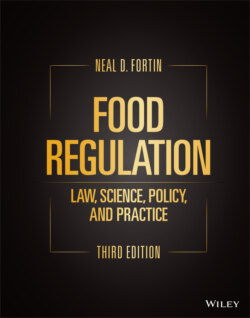Читать книгу Food Regulation - Neal D. Fortin - Страница 219
4.7.2 Express versus Implied Claims
Оглавление“Expressed” claims directly characterize the nature of a food; for example, “low fat” and “fat free.” “Implied” claims indirectly characterize the nature of the food by inference or association, rather than by direct statement; for example, “baked, not fried” implies the food is lower in fat than an equivalent fried version. The context and the entire label are often necessary to determine if there is an implied claim.
Implied claims are prohibited when they wrongfully imply that a food contains or does not contain a meaningful level of a nutrient. For example, a product claiming to be made with an ingredient known to be a source of fiber (such as “made with oat bran”) is not allowed unless the product contains enough of that ingredient to meet the definition for “good source” of fiber. As another example, a claim that a product contains “no tropical oils” is allowed—but only on foods that are “low” in saturated fat because consumers have come to equate tropical oils with high saturated fat.
